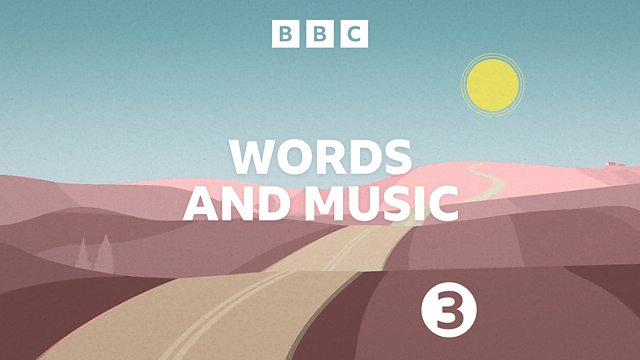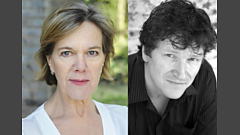
Free Thinking: The One and the Many
A special edition of Words and Music, recorded earlier as part of the Free Thinking Festival. Carolyn Pickles and Jonathan Keeble read texts on 'The One and the Many'.
A special edition of Words and Music, recorded earlier today in the Glass Box at Sage Gateshead as part of the Free Thinking Festival. Carolyn Pickles and Jonathan Keeble read poetry and prose on the festival's theme of 'The One and the Many'. The programme will explore literary and real people who have thought or acted differently from the crowd - and the crowd's attitude to them. Including texts by George Orwell, Albert Camus and Elizabeth Jennings, and music by Benjamin Britten, Bohuslav Martinu and Igor Stravinsky.
Producer - Ellie Mant.
Last on
More episodes
Previous
Next
Music Played
Timings (where shown) are from the start of the programme in hours and minutes
-
![]() 00:00
00:00Herbert Howells
Procession (extract)
Performer: London Symphony Orchestra, Richard Hickox (conductor).- CHANDOS CHAN24120.
- CD1 tr6.
-
Hans Christian Andersen
The EmperorÂ’s New Clothes, read by Carolyn Pickles
Soren Kierkegaard
The Diary of Soren Kierkegaard, read by Jonathan Keeble
![]() 00:03
00:03Dobrinka Tabakova
Such Different Paths (extract)
Performer: Janine Jansen, Julia-Maria Kretz (violins), Amihai Grosz, Maxim Rysanov (violas), Torleif Thedeen, Boris Andrianov (cellos), Stacey Watton (double bass).- ECM 4764826.
- Tr9.
Elizabeth Jennings
World I have not Made, read by Carolyn Pickles
![]() 00:06
00:06Darius Milhaud
La Création du Monde (extract)
Performer: Orchestre national de Lille-Region Nord/Pas de Calais,Jean-Claude Casadesus (conductor).- NAXOS 8.557287.
- Tr1.
Albert Camus, trans Joseph Laredo
The Outsider, read by Jonathan Keeble
![]() 00:12
00:12William Lawes
When man for sin thy judgment feels (extract)
Performer: Robin Blaze (countertenor), Elizabeth Kenny (lute).- HYPERION CDA67589.
- Tr26.
Katharine Towers
Murmuration, read by Carolyn Pickles
![]() 00:16
00:16P?teris Vasks
Flying birds music (extract)
Performer: Moscow Contemporary Music Ensemble.- OLYMPIA OCD282.
- Tr3.
Edgar Allan Poe
Alone, read by Jonathan Keeble
![]() 00:20
00:20Germaine Tailleferre
Partita for Piano: Perpetuum mobile
Performer: Cristina Ariagno (piano).- TIMPANI 1C10741.
- Tr25.
![]() 00:23
00:23Ernest Bloch
From Jewish Life; Prayer (extract)
Performer: Steven Isserlis (cello), Moscow Virtuosi, Vladimir Spivakov (conductor).- RCA 09026 619662.
- Tr6.
Thomas Keneally
SchindlerÂ’s Ark, read by Carolyn Pickles
Thomas Hill
The Schoole of Skil, read by Jonathan Keeble
![]() 00:27
00:27Philip Glass
Etude no.1
Performer: Philip Glass (piano).- ORANGE MOUNTAIN OMM0009.
- Tr1.
Billy Collins
The Parade, read by Carolyn Pickles
![]() 00:31
00:31Charles Ives
Walking
Performer: Gerald Finley (baritone), Julius Drake (piano).- HYPERION CDA67516.
- Tr18.
![]() 00:34
00:34Zoltán Kodály
Sonata for solo cello; Adagio (extract)
Performer: Truls Mørk (cello).- SIMAX PSC1023.
- Tr7.
George Orwell
1984, read by Jonathan Keeble
Charles Dickens
A Tale of Two Cities, read by Carolyn Pickles
![]() 00:37
00:37Benjamin Britten
Peter Grimes; Who holds himself apart, lets his pride rise (extract)
Performer: Chorus and Orchestra of the Royal Opera House Covent Garden, Bernard Haitink (conductor).- EMI CDS7548322.
- CD2 tr17.
John Keats
O Solitude, read by Jonathan Keeble
![]() 00:41
00:41Charles Koechlin
Sonata for 2 flutes, Op.75; Allegro
Performer: Fenwick Smith and Leone Buyse (flutes).- HYPERION CDA CDH55107.
- Tr17.
Robert Ardrey
The Social Contract, read by Carolyn Pickles
![]() 00:45
00:45Ferruccio Busoni
Piano Concerto; Pezzo giocoso (extract)
Performer: Marc-Andre Hamelin (piano), The City of Birmingham Symphony Orchestra, Mark Elder (conductor).- HYPERION CDA67143.
- Tr2.
AE Houseman
Oh Who is that Young Sinner, read by Jonathan Keeble
![]() 00:49
00:49Gabriel Fauré
Prison
Performer: Philippe Jaroussky (countertenor), Jerome Ducros (piano).- ERATO 2564616695.
- CD1 tr16.
![]() 00:51
00:51Modest Mussorgsky
Reminiscence of Childhood (extract)
Performer: Viktoria Postnikova (piano).- OLYMPIA OCD117.
- Tr18.
Charlotte Brontë
Jane Eyre, read by Carolyn Pickles
![]() 00:54
00:54Igor Stravinsky
The Rite of Spring (extract)
Performer: City of Birmingham Symphony Orchestra, Simon Rattle (conductor).- EMI CDC7496362.
- Tr11.
Siegfried Sassoon
Concert Interpretation, read by Jonathan Keeble
Fleur Adcock
Immigrant, read by Carolyn Pickles
![]() 01:00
01:00John Ireland
Ballade of London nights (extract)
Performer: John Lenehan (piano).- NAXOS 8.570461.
- Tr18.
Nick Hornby
Fever Pitch, read by Jonathan Keeble
![]() 01:03
01:03Bohusav Martinu
Half Time (extract)
Performer: Brno State Philharmonic Orchestra, Petr Vronsky (conductor).- SUPRAPHON CO1669.
- Tr1.
Harold Monro
Journey, read by Carolyn Pickles
![]() 01:07
01:07Michael Nyman
MGV; 1st Region (extract)
Performer: Michael Nyman Band, Michael Nyman (conductor).- ARGO 4433822.
- Tr5.
William Blake
Oh why was I born with a different face?, read by Jonathan Keeble
![]() 01:11
01:11Johann Sebastian Bach
Violin Sonata no.1 in G minor, BWV.1001: Adagio (extract)
Performer: Julia Fischer (violin).- PENTATONE PTC5186072.
- Tr1.
Words and Music:The One and the Many
The One and the Many – Producer Note
The programme begins with a character who really does stand out from the crowd – Hans Christian Andersen’s Emperor, who proudly parades his non-existent new clothes until a child points out that he’s naked. For me this extract exemplifies the theme of The One and the Many: Someone who thinks or acts differently to the crowd, and the crowd’s attitude towards them. Kierkegaard explores the idea that the truth always rests with the minority, as the majority is formed by people with no opinion of their own, and Elizabeth Jennings describes the feeling of being an outsider in world created by somebody else. Another famous outsider is Camus’ anti-hero Meursault, who refuses to conform to social norms, instead living by his own set of truths. And then to one of the most impressive displays of crowd behaviour – a murmuration, described in a poem by Katharine Towers.
I wanted to include some real-life individuals whose thoughts and deeds went against the prevailing view. Oskar Schindler rescued over a thousand Jews from the clutches of the Nazis by employing them in his factories during the 2nd World War. Centuries earlier, Copernicus’ theory on the movement of planets around the sun was perplexing to many, including 16th Century astronomer Thomas Hill who couldn’t understand how the earth could turn quickly without everything falling off it.  Â
Billy Collins’ The Parade describes the exhilaration of marching with a crowd, while also lost in a private dream. And private thoughts are crucial to Winston Smith who is trying to hold out against the tyranny of the Thought Police in Orwell’s 1984. Mob rule comes to the fore in Dickens’ A Tale of Two Cities, which describes the lynching of a prisoner during the French Revolution. I’ve paired this musically with The Borough rising up against outsider Peter Grimes in Britten’s opera. Robert Ardrey explains how far from being chaotic, a mob is actually a very orderly phenomenon; the music I’ve chosen for that is an extract from Busoni’s eccentric piano concerto, where the soloist really has to fight to be heard above the massed orchestra. Then two more characters who are persecuted for being different: Houseman’s Young Sinner and Brontë’s Jane Eyre.
Siegfried Sassoon’s poem Concert Interpretation interested me because it shows how a group mentality can change over time - Stravinsky’s Rite of Spring which caused a riot at its premiere is met with genteel applause just a few years later. Nick Hornby describes the anger and disappointment of a football crowd (followed by the only piece of classical music I know that’s about football!), and then a poem about another accidental group of people, this time rail commuters.
Fleur Adcock describes the lonely experience of being an immigrant in a new country, followed by a poem by William Blake; something of an outsider himself - Oh why was I born with a different face? The programme ends with a solitary solo violin.
Ellie Mant - Producer
Broadcast
- Sun 11 Mar 2018 17:30Â鶹ԼÅÄ Radio 3
The hidden history of plant-based diets
Books website
Get closer to books with in-depth articles, quizzes and our picks from radio & TV.



